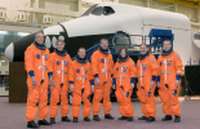
On October 10th 2008, the Space Shuttle Atlantis is due to launch for a final mission to the Hubble Space Telescope. On this mission, the astronauts will make necessary repairs and upgrades to the 18 year old station, in order to get 7 or so more years of life from the invaluable telescope.
What makes this flight interesting, is that since the Columbia disaster, this is the first Shuttle flight where the destination is not the International Space Station (ISS). After Columbia, one of the main tasks of all flights is to look for Shuttle damage while it’s docked at the ISS. If there is sufficient damage to the Shuttle, they could abandon the Shuttle and leave it at the ISS, the crew returning to Earth in one of the Russian cargo modules.
With this Hubble mission, the astronauts will have no ability to get to the ISS due to the differences in the orbits of the ISS and the Hubble. If there is sufficient damage to Atlantis whereby it would present a problem upon re-entry, NASA is taking the unprecidented step of reading the Shuttle Endeavor for a “rescue” mission to the Atlantis. Here, the Endeavor would launch with a skeleton crew of 4, and would be “docked” with Atlantis at the Hubble, transferring the 7 Atlantis crew members to the Endeavor. Endeavor would transport everyone home, and Atlantis would be allowed to disintegrate into the Earth’s atmosphere. Leaving only Endeavor and Discovery as workable Shuttles, this would effectively end the Shuttle program 2 years early, as they are scheduled to be retired in 2010.
This marks the first time since 2001 that two Shuttles were ready on their respective launch pads.
Clearly, the need to send Shuttles to the ISS after 2010 is needed. Given the current political climate between the US and Russia, leaving all missions for the ISS to the Russians – for people and cargo – is something that I don’t think should be tolerated. While we have had some problems with the Shuttle over the last 20 years, we appear to be in a time of “high confidence” and safety measures with the Shuttle program. Dozens of cameras capture all angles of a Shuttle launch, and all efforts are made while in orbit to view any possible damage either in real time via space-walks, or via recorded footage from launch. I see no reason why there should be a rush to retire the [aging] Shuttle program.
Apparently, NASA administrator Griffin feels the same. Let’s hope that there is a way to keep the Shuttle program active – even on a limited basis – until the ISS and the next future vehicle by NASA is completed. I don’t think it’s appropriate to rely on the Russians given the current political climate.
Click here, for some rare photos from the upcoming Atlantis launch:
And in a slightly related story, here are some photos and information about the Russian Space Shuttle, called the “Buran” which was disbanded in 2003 or so.

